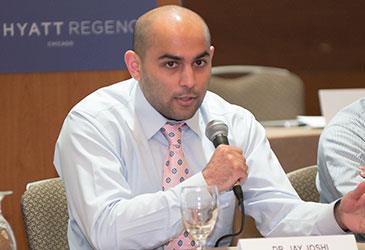As health care continues to rapidly evolve, physician entrepreneurship is increasingly important to ensure the right changes are made for patient care. Physician entrepreneurs and investment experts spoke to residents and medical students at the 2016 AMA Annual Meeting about the decision to take ideas from concept to company.
“The best advice I received,” said Jay Joshi, MD, primary care physician, CEO and founder of Output Medical, and co-founder of MD Angels, “is that this is not different than any other form of clinical practice. Being a physician entrepreneur does not necessarily mean that you’re sacrificing current clinical practices for a business.” 
“In order to be successful in medical and health care innovation, you have to have a very strong understanding of the clinical fundamentals that you’re trying to address,” Dr. Joshi said. “Don’t think of this as trying to divert off the path of traditional clinical medicine, but rather think of this as a way to enhance current clinical guidelines in terms of practice.”
Entering the entrepreneur space requires risk and soul searching
We live in a world of startups and innovative ideas. So when an idea comes to you and you go through the steps to design, develop and prototype your idea, the next logical step is to seek funding and partnership. But you need to know what you’re getting into.
“How do you really know that this is for you?” Dr. Joshi said. “Look at it analytically …. The way I like to look at this is to understand the opportunity-cost and the risk associated with the opportunity-cost of any decision that you want to make.”
For example, if you finish your education and residency and make the decision that you want to pursue an entrepreneurial venture, look 10 years into the future when you would have your practice and your business and ask yourself how much time and energy you would allocate to your practice relative to your business, he said.
Make sure you’re comfortable with taking the risks that are involved regarding your time and the fact that you may not be paid for every hour that you put into your business. If the benefits and your passion outweigh the risks—and you are willing to take those risks—then it may be the right path for you.
An entrepreneur is somebody who not only has an idea and is willing to start a business but who is also willing to take risks to get it off the launch pad.
Finding those “lightbulb” moments
The panelists agreed that there are obvious clinical unmet needs everywhere you look. It’s a matter of trying to understand what is inefficient or problematic in patient care and how you can make it better.
Here are two ways the panelists said that a resident or medical student can get started:
- Right place, right time - One shared opinion was that if you don’t have an idea, create the atmosphere for the ideas to come to you. The best and most efficient way for medical students or residents to access to those lightbulb moments is to pick the brains of your attendings. While students or residents can think of innovative, creative ways to do things better, the people who’ve already identified all of those inefficiencies and problems for you are those attendings who’ve been there for many years and have already thought through how surgery could be done in new ways or how to better channel patients through the clinic.
- Inject yourself into the tech world - “Getting involved with a company early on is also going to help you,” said Arnab Sarker, director of operations at K Street Capital and founding member of 1776, an incubator and seed fund. “One of the most underrated opportunities for residents, fellows and med students is being a first follower at a company because then you really get to understand what are the mechanics behind an idea.” “There’s a lot that matters outside of the idea,” Sarker said. “There’s plenty of ideas out there, but to understand which ones are actually viable, it’s good to get involved with an actual company. I tell people to just work for free.” “Tell them you’re a clinician full time and you just want to get some experience,” he said. “You do have something to offer from your experience …. Be a consultant, be on their board and after a while—I guarantee—they’re going to need you.”




